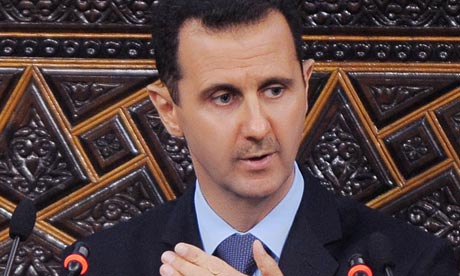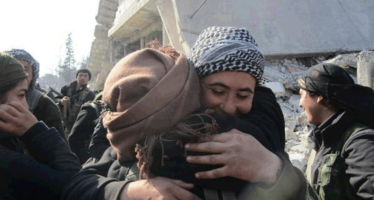Assad regrets Syrian forces shooting down Turkish fighter plane
![]()
Syrian president says he wishes incident had not happened and hopes tensions with Turkey do not escalate into armed conflict
Constanze Letsch in Istanbul

President Bashar al-Assad expressed regret over the downing of a Turkish warplane by Syrian forces, but criticised Ankara for cutting diplomatic ties with Damascus. Photograph: Ho/AP
Syria’s president, Bashar al-Assad, has expressed regret for the shooting down of a Turkish jet by his forces, and said he hoped growing tensions between the two countries would not escalate into an armed conflict.
In an interview with Cumhuriyet, a secular Turkish daily critical of the AKP government, Assad said the fighter jet had used the same route as Israeli planes in the past, which is why it was “treated like an Israeli plane”.
“I wish that it had not happened,” he said.
Assad said he was confident that neither the Syrian nor the Turkish people would allow the crisis to deteriorate into open military conflict, but he criticised Ankara for cutting diplomatic ties with Damascus.
“Ever since the new general chief of staff was named [on 4 August 2011], all communication between us and the Turkish military has been cut.”
Arguing that countries should keep channels of communication open at all times, he added: “There is not a single Turkish commander we could call in moments of crisis.” Serhat Güvenç, lecturer in international relations at the Kadir Has University in Istanbul, said Assad’s comments underlined the need for states to maintain back-channel communication even at times of crisis.
“Communication and trust are the basis of international relations. A lack of communication escalates rather than de-escalates tension and might in fact be the reason for more unfortunate events in the future. It is very dangerous.”
He said one reason for this was the increasing personalisation of Turkish foreign policy under the prime minister, Recep Tayyip Erdo?an, over the past five years: “Relations with other countries are increasingly shaped along personal relations between Erdo?an and other country’s leaders, for better or for worse.”
Pointing out that this left little to no space for lower level communication, he added: “Even during the cold war, opponents tried to keep back-channels open. But with [Syrian-Turkish] relations completely severed at the highest level, actors on lower levels have no room for manoeuvre.”
This is not the first time that tensions between Turkey and Syria have edged towards crisis. In 1957, Turkey mobilised its army on the Syrian border and in 1998, Turkey threatened to invade Syria to force its government to expel Kurdish separatist leader Abdullah Öcalan.
“But this is the first time that Turkey has so openly pursued regime change,” Güvenç said. “It is also the first time in Turkish history that a group of armed rebels wanting to overthrow another government is hosted on Turkish soil.”
According to Turkish media reports, 85 Syrian soldiers including one general fled to Turkey on Monday night, in one of the largest mass-defections since the conflict began. Most of them had reportedly served in the province of Homs. The Turkish foreign ministry said the number of Syrian refugees in Turkish refugee camps had increased to more than 35,000 in the last days.
Related Articles
Killer Fires and the Homeless
![]()
What Does It Say About Us? Eight young people, who the Fire Department said were “trying to stay warm,” perished
Egipto. Un ejército que se dice del pueblo
![]()
El ejército está a cargo. Llámelo un golpe si le gusta. Pero el ejército egipcio –o el infame Consejo Supremo
LAS MILICIANAS DE ROJAVA SON DIGNAS HEREDERAS DE UNA TRADICIÓN DE LUCHA
![]()
Nos las presentan como heroínas salidas de la nada, que armas en mano luchan junto a los hombres, defendiendo la ya épica ciudad de Kobane. Las jóvenes milicianas y sus oficiales mujeres son, sin embargo, continuadoras de lo que ya se ha convertido en una “tradición” entre las mujeres kurdas, luchar por la libertad de su pueblo y por su propia liberación. Detrás de imágenes y noticias se esconde la verdadera historia del proceso de liberación de la mujer en el Kurdistán, en la que el PKK ha jugado un papel casi fundacional.



